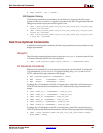
104 www.xilinx.com SPI-4.2 Lite v4.3 User Guide
UG181 June 27, 2008
Chapter 5: Constraining the Core
R
• INST
"<sink_instance_name>/U0/pl4_lite_snk_io0/buffer_data/Dat*"
DIFF_TERM = TRUE;
• INST "<sink_instance_name>/U0/pl4_lite_snk_io0/buffer_data/Ctl"
DIFF_TERM = TRUE;
Area Group Constraints
The area group constraints can be used by the user to define a specific placement of the
sink core. These constraints are not required for Sink cores that use global clocking
distribution but are recommended for Sink cores that use regional clocking distribution.
The following static alignment constraints are used to place the Sink core in one clock
region in the example UCF:
• * INST <snk_instance_name>/* AREA_GROUP = AG_pl4_lite_snk;
• * AREA_GROUP "AG_pl4_lite_snk" RANGE = CLOCKREGION_X0Y4;
Timing Ignore Constraints
If Sink core static configuration signals are driven statically from a register, apply timing
ignore attributes (TIG) to the static configuration signals to create proper timing ignore
paths. If these are driven statically from a wrapper file, then a TIG is not needed.
In the example UCF file, these constraints are commented out. Add the constraints listed
below include them in the design.
• NET "SnkAFThresAssert(*)" TIG;
• NET "SnkAFThresNegate(*)" TIG;
• NET "FifoAFMode(*)" TIG;
• NET "NumDip4Errors(*)" TIG;
• NET "NumTrainSequences(*)" TIG;
• NET "RSClkPhase" TIG;
• NET "RSClkDiv" TIG;
Source Core Required Constraints
Timing Constraints
Timing constraints are critical for proper operation. The following constraints are provided
with the SPI-4.2 Lite core, and the user can modify these constraints to meet their system
requirements. In the examples below, the target performance is 340 Mbps. However, the
user is responsible for ensuring that any modification to these constraints does not result in
paths which are unconstrained.
Timenames for Clocks
The following constraints are for the Source core clocks, and are always required.
• NET "SysClk_P" TNM_NET = "SysClk_P";
• NET "TSClk" TNM_NET = "TSClk" (for source status I/O type of
LVTTL);


















